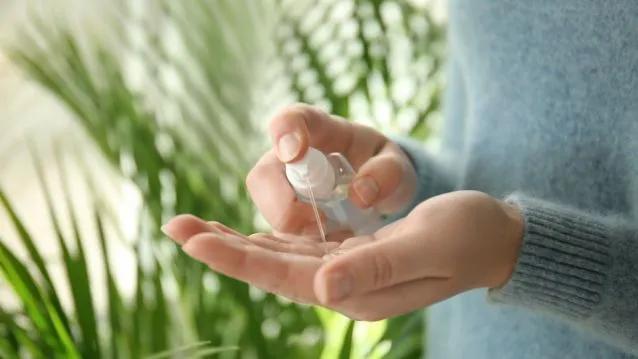Just when you thought the only thing that could get you through Covid-19 was your mask and trusty hand sanitizer, here comes another recall. The FDA is warning consumers and health care professionals about hand sanitizer products containing methanol and 1-propanol. Both contaminants are extremely dangerous and even proven to be deadly, especially when accidentally ingested by children. Here’s what’s up with the latest hand sanitizer recall.
Contaminated hand sanitizer poses a deadly threat
Recently, the U.S. Food & Drug Administration (FDA) began urging consumers to avoid purchasing — and stop using any hand sanitizers — manufactured in Mexico by Harmonic Nature S de RL de MI. Here’s the thing, while these products are labeled to contain ethanol or isopropyl alcohol, which are deemed safe and somewhat effective to kill germs, they have tested positive for 1-propanol or methanol. But don’t confuse 1-propanol with safe ingredients like 2-propanol, isopropyl alcohol, or isopropanol. In addition, the FDA has expanded its “do-not-use” list of hand sanitizers to include other hand sanitizer products that may be potentially contaminated with 1-propanol. Please visit www.fda.gov/unsafehandsanitizers for a complete list.
1-propanol poisoning symptoms
1-propanol is a colorless liquid with a mild, alcohol-like odor that’s toxic, according to the Centers for Disease Control and Prevention (CDC). Typically, the chemical industry uses it to make resins. When inhaled, ingested, or absorbed into the skin, 1-propanol can cause a variety of symptoms such as:
- Headache
- Drowsiness
- Irritation to the nose, throat, and eyes
- Dry, cracking skin
- Stomach pain and abdominal cramping
- Vomiting and Diarrhea
- Ataxia, a degenerative disease of the nervous system
Methanol poisoning symptoms
Methanol, also known as methyl alcohol, is a clear liquid with a strong smell. The CDC warns that it is a highly poisonous substance when absorbed through the skin, eyes, lungs, and digestive system. Overexposure can even lead to death. Typically, methanol is used in industries for manufacturing polyesters, plastics, and other chemicals. It’s also used as a solvent and deicer. Yet, somehow this chemical deemed unsafe by American standards has found its way into hand sanitizer. Symptoms of exposure, according to the CDC include:
- Headache,
- Nausea, abdominal pain, and vomiting
- Loss of coordination
- Moving beyond consciousness and seizures
- Severe anion-gap metabolic acidosis (an over-production of acid unable to be removed by the kidneys.)
- Blurred vision and even permanent blindness
- Methanol poisoning may lead to death
Ingesting may cause blindness and even death
Even if you feel there is no immediate threat by using these hand sanitizers, keep in mind that anyone ingesting 1-propanol and methanol contaminated products can die. They pose a particularly high risk for children who accidentally ingest the product, or adults and teens who purposely ingest hand sanitizer as a substitute to drink alcohol. In fact, amid this recall, four adults have died after ingesting hand sanitizer, and 11 others are hospitalized — three with permanent vision damage — according to the CDC.
Here’s what to avoid when buying hand sanitizer
There’s a reason why hand sanitizers are so popular. Using them reduces bacterial counts on your hands and may kill many harmful germs that could infect people with viruses. However, while alcohol-based hand sanitizers may kill a wide variety of bacteria and viruses, studies suggest they aren’t effective on all germs. This is why the FDA is quick to remind people that no hand sanitizers are approved to prevent the spread of COVID-19. Yet, some hand sanitizers often come with misleading marketing hype stating they prevent the spread of viruses such as Covid-19. Here’s what you need to avoid when choosing a hand sanitizer:
- Hand sanitizers that don’t contain a sufficient amount of isopropyl or ethyl alcohol.
- Hand sanitizers that claim they provide prolonged protection for up to 24-hours.
- Hand sanitizers that are falsely marketed as “FDA-approved.” There are no hand sanitizers approved by the FDA.
- Hand sanitizers labeled with toxic ingredients, such as methanol.
- Hand sanitizers packaged to look like candy, cocktail drinks, or liquor bottles, since their appearance could result in accidental ingestion or even encourage ingestion. Even a small amount taken by a child could be lethal.
Choose sanitizers with a high concentration of alcohol
If soap and water are not available to cleanse your hands, use an alcohol-based hand sanitizer that contains at least 60 percent alcohol. Studies show that sanitizers containing low concentrations of alcohol — or non-alcohol-based hand sanitizers — can’t kill germs. Additionally, hand sanitizers with less alcohol concentration can really only decrease the growth of germs somewhat, instead of killing them outright. When using hand sanitizer: apply enough hand sanitizer (as per label instructions) to the palm of one hand and rub the product all over the surfaces of both your hands — until your hands are dry.
Bottom line: But be cautious with hand sanitizers manufactured via Mexico or labeled with methanol.
-Katherine Marko

